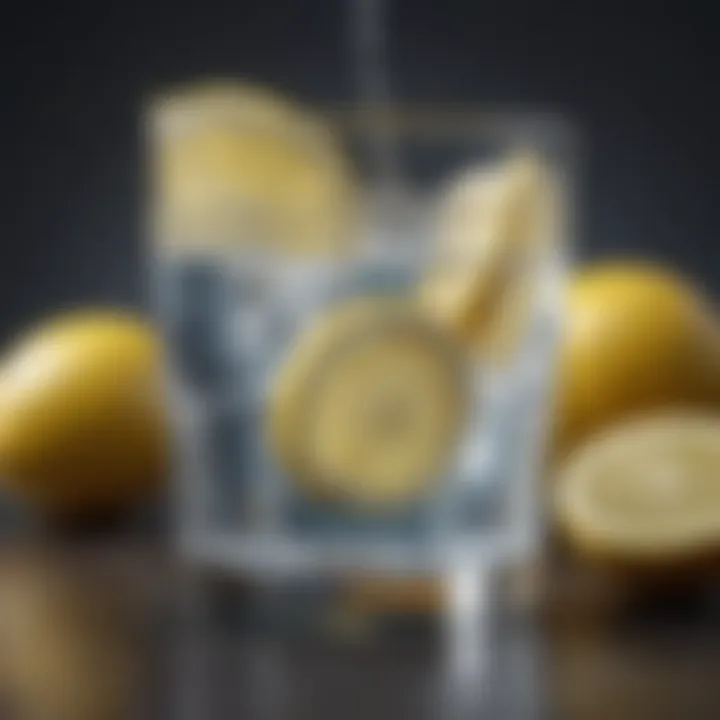Effective Strategies for Overcoming Hangover Symptoms


Intro
Experiencing a hangover is an all-too-familiar scenario for many who enjoy a night out. Excessive alcohol consumption can transform a blissful evening into a morning filled with discomfort, leaving one feeling like they've been hit by a freight train. Symptoms such as nausea, headache, fatigue, and thirst can make even the strongest among us feel utterly defeated. Yet, the science behind these symptoms is worth exploring. Understanding the body's responses not only paves the way for effective remedies but also helps us to prevent future ordeals.
Hangovers are essentially the body's reaction to alcohol, which disrupts various bodily functions. Tackling this issue involves a multifaceted approach—it's not just about drinking water or taking painkillers. Effective recovery can hinge on proper dietary choices, hydration strategies, and even alternative therapies.
This article aims to provide a comprehensive guide through the maze of hangover solutions. From understanding what really happens to your body after a night out, to offering actionable tips for recovery, this exploration promises to be informative and practical.
"Recovery from a hangover is both an art and a science—a delicate balance between understanding your body and listening to its needs."
The sections ahead will dive into effective dietary solutions, hydration insights, and various therapies to help alleviate these pesky symptoms. Whether you’re looking for quick fixes or long-term strategies, rest assured there’s something here for everyone. Following this guide, you can arm yourself with knowledge to enhance well-being in the aftermath of a good time gone slightly too far.
Understanding Hangovers
Understanding hangovers is crucial for anyone who indulges in alcoholic beverages, whether at social gatherings or quiet evenings at home. This knowledge not only helps in recognizing the signs of a hangover but also equips individuals with strategies to minimize the suffering that often follows a night of revelry. It’s a balancing act between enjoying what life brings while preparing for the consequences that may come with it.
Defining a Hangover
A hangover can be simply defined as the collection of symptoms that appear after excessive alcohol consumption. It’s not just a case of feeling poorly; a hangover can manifest in various ways, such as headache, fatigue, and nausea. When you drink more than your body can process, it leads to a cascade of physical reactions that leave you feeling less than your best. This understanding lays the groundwork needed to address what might be happening inside the body.
Physiological Mechanisms
At the heart of a hangover are several physiological mechanisms that occur when alcohol enters the bloodstream. First off, alcohol causes dehydration since it acts as a diuretic, leading to increased urination. This loss of fluids can cause headaches and dry mouth, often the first signs of a hangover.
Secondly, alcohol disrupts the balance of electrolytes in the body. When dehydration sets in, vital minerals like sodium and potassium can drop, contributing to symptoms like fatigue and weakness.
Moreover, alcohol affects the way glucose is processed by the body. Low blood sugar, a common aftereffect, leads to shakiness, mood changes, and intensified cravings for unhealthy foods. Understanding these mechanisms helps to appreciate why certain remedies can work better than others in easing the discomfort.
Common Symptoms
The signs of a hangover are as diverse as the drinks that may have caused them. Some common symptoms include:
- Headaches: Often pounding, brought on by dehydration and the withdrawal from alcohol.
- Nausea: A feeling of queasiness that can be triggered by irritation in the stomach lining.
- Fatigue: A deep sense of tiredness that can persist for hours or even longer as the body is trying to recover.
- Sensitivity to Light and Sound: The brain may become hyper-sensitive post-drinking, leading to discomfort in bright light or loud sounds.
- Mood Disturbances: Anxiety and irritability can stem from chemical changes in the brain post-alcohol.
By recognizing these symptoms, individuals can better tailor their approach to recovery, as each symptom may point to a specific underlying issue.
Immediate Relief Strategies
When the aftereffects of a night out start kicking in, immediate relief strategies become paramount. These methods can dramatically ease the misery of hangover symptoms, enabling individuals to reclaim their day. By understanding and implementing effective relief options, one can navigate the rough waters of post-drinking recovery effectively.
Prioritizing Hydration
One of the most critical elements in alleviating hangover symptoms is proper hydration. During alcohol consumption, the body loses a vast amount of fluids, leading to dehydration. The relationship between dehydration and hangovers is akin to a double-edged sword because the more alcohol consumed, the more dehydrated a person becomes.
To combat this, drinking plenty of water or electrolyte-rich beverages should be the top priority. Coconut water, for example, can work wonders. Its rich composition of potassium helps in replenishing lost minerals and balancing electrolyte levels. Consider keeping a bottle of water by your bedside or setting reminders on your phone to gulp down fluids throughout the day.
"Drinking water is a no-brainer, but I can’t stress it enough; it’s the best medicine when you’re dealing with a hangover."
Nutritional Intake
The types of food and drink consumed can either alleviate or worsen a hangover. Before delving thoughtlessly into greasy breakfasts, one might consider more thoughtful choices that provide nutrients aimed at recovery. For instance, foods high in electrolytes like bananas, or a bowl of oatmeal, can help stabilize blood sugar levels.


Fruits like oranges are high in vitamin C, which can promote a quicker rebound. Incorporating protein is equally important, because it helps sustain energy levels. Scrambled eggs, with their cysteine, are infamous for breaking down acetaldehyde, a toxic byproduct of alcohol that often contributes to hangover misery.
However, it’s wise to steer clear of items that challenge your stomach further. Spicy or overly rich foods may intensify nausea and discomfort. The focus should lie on easily digestible, wholesome options, giving the body the proper tools to heal.
The Importance of Rest
Rest plays a remarkable role in recovery. Sleep is the body’s natural repair mechanism, and after a drinking spree, prioritizing rest could be a game changer. A hangover typically brings fatigue and malaise, symptoms pointing towards the body’s desperate need for rejuvenation.
Creating a restful environment is essential. Keeping the lights dim, reducing noise, and allowing the body to slip into restorative sleep will allow it to heal and process the alcohol faster. While one might feel the urge to burden their system with activities or excessive stimulation, giving oneself permission to simply rest could lead to swift recovery.
By permitting adequate downtime, the body processes toxins and restores balance more effectively, helping to overcome that sluggish feeling sooner.
Through effective hydration, mindful nutritional choices, and prioritization of rest, one can significantly mitigate hangover symptoms, paving the way toward feeling better, faster.
Food and Drink Remedies
Food and drink remedies hold a significant place when it comes to tackling hangover symptoms. A hangover can leave you feeling like you've been hit by a freight train. What you consume right after, or even before drinking, can heavily influence your recovery process. Nutritional choices can either prolong your suffering or pave the way for a faster return to normalcy. Let's dive into what works best and why it matters.
Best Foods for Recovery
In the aftermath of a night filled with excessive drinking, the kind of food you find on your plate will play a crucial role in how you feel. Eating well isn’t just essential for overall health; it's especially vital when nursing a hangover. Opting for whole, nutrient-rich foods can help restore balance in your system.
- Bananas: Rich in potassium, bananas are your best friend after alcohol consumption. They help replenish electrolytes that get lost when drinking.
- Eggs: Believe it or not, eggs contain cysteine, an amino acid that helps break down a hangover-causing toxin called acetaldehyde. A simple scrambled egg can pack a punch!
- Toast or Crackers: Simple carbs can ease your stomach's upset. Toast or crackers are easy to digest if your body is rebelling against food.
- Oats: A warm bowl of oatmeal is not just comforting; it contains B vitamins, which are often knocked out due to drinking.
Picking these foods can ease your recovery significantly; they aren’t just favorites for taste but are also meant to help you get back on your feet.
Beverages to Consider
Hydration is king when it comes to beating a hangover. While water should be a staple of your recovery, it's not the only liquid that works wonders. Choosing the right drinks can enhance your healing process.
- Coconut Water: It's a natural source of hydration filled with electrolytes. Drinking coconut water can make a world of difference, offering a refreshing change from plain water.
- Ginger Tea: If your stomach is churning, ginger tea might be your saving grace. Ginger has long been known for its anti-nausea properties and can provide a soothing effect on your upset tummy.
- Bone Broth: A warm cup of bone broth can nourish your body while supplying the necessary hydration and minerals.
- Fruit-Infused Water: If plain water feels too dull, try infusing it with fruits like lemon, berries, or cucumber. Not only does it make hydration more enticing, but those fruits also contribute vitamins and minerals.
Choosing the right beverages can bolster your healing process and elevate your mood as you sip away the after-effects of last night's festivities.
Caffeine: A Double-Edged Sword
Ah, caffeine—the age-old remedy that brings a mix of responses. Some swear by their morning coffee as the antidote to tingling heads and lethargy, whereas others find it exacerbates their symptoms. Understanding both sides can help you make an informed choice.
On one hand, caffeine constricts blood vessels and can provide relief from certain types of headaches. Just a small cup may awaken you from your cocktail-induced slumber. However, caffeine can also lead to dehydration, which is the last thing you want while recovering.
So, if you're considering that espresso shot, keep these pointers in mind:
- Start slow; a small amount may help, but too much can backfire and worsen dehydration.
- Try pairing caffeine with lots of water or a hydrating drink to counter any dehydration effects.
In essence, caffeine can be helpful in moderation but choose wisely to surf the fine line of relief and discomfort.
Supplementation Options
When it comes to navigating the rough waters of a hangover, supplementation options often play a pivotal role. These remedies can be the lifesaver that many seek when battling the throbbing headache and queasiness that accompany overindulging in revelry. With the right approach to vitamins, herbs, and electrolyte solutions, individuals can expedite their recovery process and ease symptoms that muddy the day after a night of fun.
Vitamins and Minerals
Vitamins and minerals are fundamental players in the recovery game. After a long night of drinking, the body often sees a decline in essential nutrients that can lead to hangover symptoms. For instance, vitamin B complex is crucial for energy metabolism. Thiamine (Vitamin B1) and riboflavin (Vitamin B2) are particularly important. They help the body convert carbohydrates into energy, and when they are in short supply, fatigue can set in.


Moreover, vitamin C is another heavyweight. It acts as an antioxidant and supports the immune system, which can be pretty handy during a hangover. One should also think about magnesium, as it helps prevent or alleviate headaches and muscle cramps, both common issues post-drinking.
A good way to source these vitamins and minerals is through supplements. However, getting them from whole foods is always the best route. Foods rich in these nutrients include leafy greens, nuts, seeds, and citrus fruits. In this context, one could even argue that stocking up on a colorful array of fruits and vegetables might be just as important as choosing a good drink the night before.
Herbal Remedies
Herbal remedies have been around forever and are often employed in various cultures for their healing properties. Two standout contenders in the hangover arena are milk thistle and ginger.
Milk thistle contains silymarin, which is thought to protect the liver from toxins and promote recovery, acting like a protective shield. By potentially aiding liver function, it may help the body process the alcohol more efficiently.
Ginger, on the other hand, shines when dealing with nausea. Known for its anti-inflammatory properties, ginger can settle an upset stomach rather handily. Tea brewed from fresh ginger root can be especially soothing for someone feeling queasy after a heavy night out. It’s like giving a warm hug to the digestive system.
Potential users should tread carefully and consult with a healthcare provider before mixing herbal supplements with medications, as interactions can be quite the pickle.
Electrolyte Solutions
Finally, electrolyte solutions are essential. After a night of drinking, dehydration isn’t just a possibility; it's practically a guarantee. Alcohol can lead to an electrolyte imbalance, which can exacerbate symptoms. Sodium, potassium, and magnesium are the key electrolytes that the body craves during this recovery phase.
Enter electrolyte drinks, such as Gatorade or Pedialyte. These drinks can replenish what’s lost and facilitate better hydration. Coconut water is another natural alternative that’s packed with electrolytes and has been gaining popularity. It’s a refreshing option when you’re looking for something that feels a bit less heavy on the stomach.
Drinking water is great, but pairing it with electrolytes can set you on the road to recovery much faster, especially if consumed throughout the day.
In summary, supplementation options are invaluable in addressing hangover symptoms, making them well worth considering for those who enjoy the occasional indulgence in social settings. Whether it’s vitamins, herbs, or electrolytes, these remedies together form a sturdy support system, helping to ease the rough edges of a post-party day.
Lifestyle Modifications for Prevention
Understanding how to prevent hangovers can be just as crucial as knowing how to alleviate their symptoms. The choices you make before, during, and after drinking can significantly impact how you feel the next day. Mindful decisions, such as pacing your alcohol consumption and being aware of what you eat and drink, can make a world of difference.
Mindful Drinking Practices
Being conscious of your alcohol consumption is essential for preventing hangovers. Setting personal limits can keep your intake moderate, and this often means defining how many drinks you aim for during an outing. Rather than treating the night as an all-you-can-drink buffet, try setting a clear cap; for instance, if you’re going to drink, say, three cocktails during the evening, have your own game plan. This can help keep your enjoyment in check while sidestepping potential regret come morning.
Moreover, alternating alcoholic drinks with water not only helps maintain hydration but may also extend the duration of your night out without overindulging. It's about finding balance - to have fun yet stay within reasonable bounds. Choose lighter drinks, such as clear spirits or mixing with soda water, which tend to result in fewer headaches compared with darker liquors.
Hydration Before and After
Hydration is one of the simplest yet often overlooked techniques in preventing hangovers. As alcohol is a diuretic, it tends to dehydrate the body. Drinking plenty of water not only before heading out but also while drinking can have profound effects. Just imagine this: for every drink you have, try chugging a glass of water in between. Your body will thank you!
Post-drinking, the first step upon waking should ideally be to reach for a tall glass of water. Electrolytes play a big role too; sports drinks like Gatorade can replenish lost minerals. Placing a water bottle on your nightstand can also serve as a gentle reminder to hydrate right when you wake up.
Food Pairing Strategies
Pairing food with drink can be a game changer. Having a solid meal before, or even during, consuming alcohol can lessen the impact of alcohol on your system. Foods high in carbs, protein, and healthy fats can help slow down the absorption of alcohol. Think of it as creating a safety net for your stomach.
Opt for hearty choices like pasta, steaks, or a rich avocado dip. Avoiding greasy fast food can also be smart; while they might seem tempting, such foods can create an upset stomach when mixed with alcohol. You might also want to consider infused water or smoothies leading to your night out. Not only do they hydrate, but they also fill you up so you're less tempted to drink on an empty stomach.
"An ounce of prevention is worth a pound of cure." - Benjamin Franklin.
These simple lifestyle modifications not only make the next day more bearable but also contribute to an overall healthier relationship with alcohol.
Alternative and Holistic Approaches
Alternative and holistic approaches play a significant role in the quest for relief from hangover symptoms. While traditional remedies focus primarily on hydration, nutrition, and rest, exploring these diverse techniques can offer additional support and may resonate well with those looking for comprehensive solutions. Holistic methods consider the mind-body connection, emphasizing treatments that promote overall well-being rather than merely masking symptoms. This section will delve into various techniques, allowing readers to discover what might work best for their individual needs as they navigate through the uncomfortable aftermath of a night out.


Acupuncture and Pressure Techniques
Acupuncture, an ancient practice from traditional Chinese medicine, involves inserting fine needles into specific points on the body. This technique is thought to stimulate energy flow, known as "qi," which can contribute to restoring balance. Many people have found relief from hangover symptoms through acupuncture, as it may help alleviate headaches and nausea by promoting relaxation and reducing inflammation.
On the other hand, acupressure, a similar yet needle-free technique, uses manual pressure on specific points to achieve the same goals. For instance, applying pressure to the "P6" point, which is found on the inner wrist, can reduce nausea. While scientific evidence supporting these methods may be limited, anecdotal success stories abound. Many swear by them, suggesting a blend of traditional wisdom and modern necessity for seeking comfort during a hangover.
Aromatherapy Benefits
Aromatherapy, the soothing art of using essential oils to enhance physical and emotional well-being, has gained traction as a holistic remedy. Certain scents can have impressive effects on hangover symptoms, especially peppermint and lavender oils. Peppermint is particularly good for its nausea-relieving properties, often inhaled or applied to the temples to reduce headache tension. Lavender, known for its calming effects, may also help to alleviate anxiety and promote better sleep, making it an excellent choice for those facing the woes of a hangover.
Moreover, using a diffuser in the recovery space can create an atmosphere conducive to relaxation. By harnessing the power of scents, individuals can find themselves drifting into a more peaceful state, which may speed up the healing process, allowing them to tackle the day ahead with renewed strength.
Massage Therapy Insights
Massage therapy has long been celebrated for its ability to reduce stress and promote relaxation, which can significantly aid in hangover recovery. The gentle manipulation of muscles can enhance circulation, reducing feelings of fatigue and soreness. Techniques, such as Swedish or deep tissue massage, target areas of tension and promote the release of endorphins, the body��’s natural painkillers. Furthermore, addressing muscle tightness can help alleviate the often accompanying headaches of a hangover.
Beyond physical benefits, massage also addresses emotional aspects by offering a comforting touch that can promote a sense of well-being. As with acupuncture, while scientific backing may vary, the sheer number of positive testimonials around massage’s effectiveness can't be overlooked. Those who emerge from a massage session often report feeling a renewed sense of clarity and energy, which may be just what’s needed to power through the rest of the day.
"Exploring alternative approaches to hangover relief can be just as crucial as traditional methods. Each serves its purpose, complementing one another in the journey towards recovery."
Recognizing When to Seek Help
Understanding when to seek professional medical assistance after a hangover can be crucial. It's natural to experience some discomfort following a night of revelry, but there are times when those hangover effects can become a sign of a more serious issue. Ignoring severe symptoms or considering them as yet another morning after unfortunate could lead to complications, which nobody wants. Thus, being able to differentiate between typical hangover symptoms and alarms that warrant professional intervention can significantly impact a person's recovery journey.
Identifying Severe Symptoms
Not all hangovers are created equal. While some people might only deal with mild headaches and nausea, others may find themselves in a worrisome state. Severe symptoms that should raise a red flag include:
- Persistent Vomiting: If you're throwing up like it's a full-time job, this can lead to dehydration or electrolyte imbalance.
- Severe Abdominal Pain: This could be more than a simple upset stomach. It might be a sign of gastritis or even pancreatitis.
- Confusion or Disorientation: If your head feels foggier than a London morning, you might be facing more than just hangover blues.
- Seizures: This is a serious condition that requires immediate medical attention.
- Extreme Fatigue or Weakness: If merely standing up feels like running a marathon, it’s time to get evaluated.
If these symptoms persist, it’s better to err on the side of caution and consult healthcare personnel. Keep in mind that the body can sometimes reveal underlying health issues that drinking exacerbates.
"Listening to your body often clears up more than any remedy can, sometimes it's the cautious approach that safeguards your health."
Consulting Healthcare Professionals
When the signs point to more than a simple hangover, reaching out to healthcare professionals is a wise choice. They can provide what a hangover remedy website or a friend cannot: expertise. Here’s why consulting professionals matters:
- Diagnosis: A healthcare provider can distinguish between a bad hangover and conditions like alcohol poisoning or pancreatitis, ensuring you get the right treatment.
- Treatment Options: They might suggest certain medications or even treatment strategies that can facilitate a quicker recovery.
- Preventive Care: Beyond just treating immediate symptoms, consulting a doctor could help you understand how to change habits to avoid severe hangovers in the future.
Next time you find yourself battling the aftermath of a wild night, keep an ear out for your body’s signals. Knowing when to seek help can make a world of difference. Ultimately, health should always be your number one priority. If in doubt, consult with a professional. They are trained to help, and there’s no harm in seeking their advice.
Concluding Thoughts
When it comes to navigating the choppy waters of hangovers, understanding effective remedies is crucial. This article not only underscores the physiological mechanisms that contribute to hangover symptoms but also shines a light on practical strategies to ease the recovery process.
In summary, addressing a hangover involves a multifaceted approach. Firstly, hydration is paramount. The body's desperate call for fluids post-alcohol consumption is not something to ignore; maintaining hydration can significantly alleviate many symptoms that stem from a hangover. Secondly, nutritional intake plays an essential role. Certain foods, such as bananas for potassium, can restore electrolyte balance and improve recovery efficiency.
Moreover, supplementing with vitamins, particularly B vitamins, can provide that extra antioxidant punch to combat oxidative stress caused by alcohol. It's worth noting that herbal remedies may also have a place in this recovery toolkit, each offering unique benefits that can support the body's natural healing processes.
"Hydration combined with smart nutrition goes a long way. Remember, a well-fed body is a resilient body."
Lifestyle choices further contribute to both prevention and alleviation of hangover symptoms. Mindful drinking practices, hydration strategies before and after alcohol consumption, and food pairing techniques are all tactics that can help.
In a realm where hangovers can feel like a mountain too steep to climb, these practical solutions serve as a comforting handhold on the journey. Recognizing when a hangover crosses the line into something more serious is yet another vital aspect. This serves as a reminder that while hangover symptoms are often temporary, they can be exacerbated by neglecting severe signs that warrant medical attention.
Ultimately, the drive to understand and respect our body's responses to alcohol can empower individuals to approach social drinking with more awareness. The insights discussed here are not just for the moment but aim for a longer-lasting impact on one's well-being. By integrating these strategies into one's lifestyle, not only can hangovers be alleviated, but their occurrence can also be reduced.
In essence, awareness and practical knowledge are the keys to turning hangover despair into manageable recovery, and that, in itself, is a worthy takeaway.







